hear等词的用法
动词hear的相关用法与语法
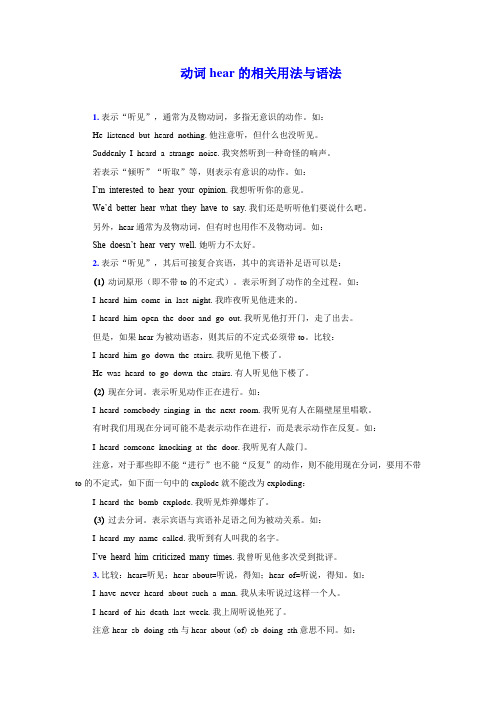
动词hear的相关用法与语法1.表示“听见”,通常为及物动词,多指无意识的动作。
如:He listened but heard nothing. 他注意听,但什么也没听见。
Suddenly I heard a strange noise. 我突然听到一种奇怪的响声。
若表示“倾听”“听取”等,则表示有意识的动作。
如:I’m interested to hear your opinion.我想听听你的意见。
We’d better hear what they have to say.我们还是听听他们要说什么吧。
另外,hear 通常为及物动词,但有时也用作不及物动词。
如:She doesn’t hear very well.她听力不太好。
2.表示“听见”,其后可接复合宾语,其中的宾语补足语可以是:(1)动词原形(即不带to的不定式)。
表示听到了动作的全过程。
如:I heard him come in last night. 我昨夜听见他进来的。
I heard him open the door and go out. 我听见他打开门,走了出去。
但是,如果hear为被动语态,则其后的不定式必须带to。
比较:I heard him go down the stairs. 我听见他下楼了。
He was heard to go down the stairs. 有人听见他下楼了。
(2)现在分词。
表示听见动作正在进行。
如:I heard somebody singing in the next room. 我听见有人在隔壁屋里唱歌。
有时我们用现在分词可能不是表示动作在进行,而是表示动作在反复。
如:I heard someone knocking at the door. 我听见有人敲门。
注意,对于那些即不能“进行”也不能“反复”的动作,则不能用现在分词,要用不带to的不定式,如下面一句中的explode就不能改为exploding:I heard the bomb explode. 我听见炸弹爆炸了。
hear等词的用法

hear的用法简单归纳如下1.hear作为行为动词听见时,hearsbdosth表示“听到某人做了某事”或“经常听到某人做某事”,hearsbdoingsth.表示“听到某人正在做某事”2.hearabout听说,hearabout+sth听到关於某事物的消息3.hearof+sb./sth听到或知道某人[某事物]的情况4.hearfrom+sb=receivealetterfrom接到某人的来信、电话等5.hear宾语从句:听说或得知(某事物)注意:上句是宾语从句,当that在宾语从句中作连词引导从句时,that可省略。
hearvt.听到,听;听说;审理hearsb可以听见某人说话可以说Icanhearyou1.I'vejustheard______hispromotion.我刚刚听到了他被提升的事。
2.Ihaveneverheard______himsinceheleft.自从他离开后,我再没听到过他的消息。
3.Doyouhear_____youdaughterthisweek今周你有收到你女儿的信吗4.Iheard_______Tomwouldleavehere.我听说Tom会离开这里.5.IthinkIcanhearsomeone______.(knock)6.Janeisgoingtoresign.Iheardher_____.(say)hear的用法简单归纳如下1.后面(that)跟从句,如:IthinkIcandobetterthanyou.变否定句,Idon'tthinkIcandobetterthanyou.2用于摘入语,如:Whodoyouthinkisgoingtospeakatthemeeting3.后面跟代词so,例如:Yes,Ithinkso.No,Idon'tthinkso.4. think+宾语+宾语补足语Hethinkshimselfveryclever.Peoplethinkhimtobeagoodteacher.5. think+wh-词+不定式Theycouldn'tthinkwheretogo.6. think+it(形式宾语)+形容词/名词+不定式/动名词/从句Idon'tthinkitpolitetospeakloudlyinpublic.Ithinkitbestthatyoushouldstayhere.7.有think构成的习惯用语有:thinkabout考虑,想到某人或某事,如:Hewasthinkingaboutamathsproblem.thinkof想,想到,如:Wemustnotthinkonlyofourselves.WhatdoyouthinkofthisT-shirt8.thinkover仔细考虑,如:Hethoughtitoverandrememberedthathehadleranedtheword"plough".9.think还有打算、想到的意思,其后常跟动词不定式,例如:WhenIthoughttoreturn,itwastoolate.10. 关于think的反意疑问句主语是第一人称:Ithinkheisright,isn'the主语是第二,三人称:Theydon'tthinkI'mright,dotheyuse的用法简单归纳如下edtodosth.意为"过去常常做某事",它表示过去经常发生的动作或存在的状态,而现在已不再发生或存在。
高考感官动词用法总结

高考感官动词用法总结在高考英语中,感官动词是一个重要的语法点。
掌握好感官动词的用法,对于理解和运用英语语言有着重要的意义。
下面我们就来详细总结一下高考中常见的感官动词用法。
一、常见的感官动词常见的感官动词有:see(看见)、watch(观看)、look at(看)、hear(听见)、listen to(听)、feel(感觉)、smell(闻)、taste(尝)等。
二、感官动词的用法1、感官动词+宾语+宾语补足语(1)感官动词+宾语+ do(表示动作的全过程,强调结果或经常性的动作)例如:I saw him cross the road(我看见他过了马路。
)We often hear her sing in the room(我们经常听见她在房间里唱歌。
)(2)感官动词+宾语+ doing(表示动作正在进行)例如:I saw him crossing the road when I passed by(我路过时看见他正在过马路。
)I heard her singing in the room at that time(那时我听见她正在房间里唱歌。
)(3)感官动词+宾语+ done(表示宾语与宾语补足语之间是被动关系)例如:I saw the window broken(我看见窗户被打破了。
)We found the tree cut down(我们发现树被砍倒了。
)2、感官动词+宾语从句例如:I saw that he crossed the road safely(我看见他安全地过了马路。
)She heard that someone was knocking at the door(她听见有人在敲门。
)3、感官动词的被动语态感官动词在被动语态中,其后的宾语补足语要用带 to 的不定式。
例如:He was seen to cross the road(有人看见他过了马路。
)The girl was heard to sing in the room(有人听见这个女孩在房间里唱歌。
hear的用法归纳

hear的用法归纳咱们平常学英语的时候,hear 这个词可是经常出现呢!今天咱们就来好好唠唠 hear 的用法。
先来说说 hear 最常见的意思,就是“听见、听到”。
比如说,“I hear a bird singing outside the window”(我听到窗外有一只鸟在唱歌。
)这时候 hear 就是单纯地表示听到某个声音。
有时候 hear 后面还会接宾语从句,像“He heard that his friend was ill”(他听说他的朋友生病了。
)这里 hear 表达的是获取到某个消息或者情况。
再说说 hear from 这个短语,意思是“收到……的来信”。
“I haven't heard from my parents for a long time”(我好久都没有收到我父母的来信了。
)想象一下,你满心期待地等着远方亲人朋友的信件,那种期待又焦急的心情,是不是很能理解 hear from 所包含的含义啦。
还有 hear of ,表示“听说”。
“Have you heard of this new movie?”(你听说过这部新电影吗?)这就好比你和朋友聊天,突然提到一个新鲜事物,然后互相询问有没有听说过。
给大家讲个我自己的小经历吧。
有一次我在公园里散步,突然听到一阵悠扬的小提琴声。
我顺着声音找过去,看到一个小男孩正在认真地演奏。
我走上前去,跟他聊了起来。
他告诉我,他每天都会来这里练习,因为他梦想着有一天能在舞台上演奏。
我当时就特别感慨,这不就是努力追求梦想的声音嘛。
而这里面,“听到”这个动作,用的就是 hear 这个词。
那咱们再回到 hear 的用法上来。
hear 用于被动语态的时候,要注意哦。
“The song was heard everywhere”(这首歌到处都能听到。
)另外,hear 与 listen 可不一样。
Listen 强调的是“听”这个动作,而hear 强调的是“听见、听到”这个结果。
hear形容词

hear的形容词形式及其用法分析hear是一个常用的英语动词,表示“听到,听见,得知,审理”等意思。
hear的形容词形式有两种,一种是hear的过去分词heard,另一种是hear的现在分词hearing。
这两种形容词形式都可以用来修饰名词或代词,表示“被听到的,听说的,听力的,审理的”等含义。
本文将介绍hear的形容词形式的用法和例句,并比较heard和hearing之间的区别和联系。
heardheard是hear的过去分词,也可以作为形容词使用。
作为形容词时,heard通常表示“被听到的,听说的”等意思。
例如:He is a well-known and widely heard radio presenter. 他是一个知名而广受欢迎的电台主持人。
hearinghearing是hear的现在分词,也可以作为形容词使用。
作为形容词时,hearing通常表示“听力的,审理的”等意思。
例如:He has a hearing problem. 他有一个听力问题。
She wears a hearing aid. 她戴着助听器。
The hearing of the case was postponed. 这个案件的审理被推迟了。
He was granted a fair hearing. 他得到了公正的审判。
hearing还可以用来构成一些固定短语或习惯用法,例如:hearing loss:听力损失。
如:He suffered from hearing loss due to loud noise. 他因为噪音太大而导致听力损失。
hearing test:听力测试。
如:She took a hearing test at the hospital. 她在医院做了一个听力测试。
public hearing:公开听证会。
如:The committee held a public hearing on the issue. 委员会就这个问题举行了一个公开听证会。
hear等词的用法

hear的用法简单归纳如下1、hear作为行为动词听见时,hear sb do sth表示“听到某人做了某事”或“经常听到某人做某事”,hear sb doing sth、表示“听到某人正在做某事”2、hear about 听说,hear about + sth 听到关於某事物的消息3、hear of + sb、/sth 听到或知道某人[某事物]的情况4、hear from + sb=receive a letter from 接到某人的来信、电话等5、hear 宾语从句: 听说或得知(某事物)注意: 上句就是宾语从句,当that在宾语从句中作连词引导从句时,that可省略。
hear vt、听到,听;听说;审理hear sb可以听见某人说话可以说I can hear you1、I've just heard ______his promotion、我刚刚听到了她被提升的事。
2、I have never heard ______ him since he left、自从她离开后,我再没听到过她的消息。
3、Do you hear _____ you daughter this week? 今周您有收到您女儿的信不?4、I heard _______Tom would leave here、我听说Tom会离开这里、5、I think I can hear someone ______、( knock)6、Jane is going to resign、I heard her_____、( say)hear的用法简单归纳如下1、后面(that)跟从句,如:I think I can do better than you 、变否定句, I don't think I can do better than you、2用于摘入语,如:Who do you think is going to speak at the meeting?3、后面跟代词so,例如: Yes ,I think so 、No,I don't think so、4. think +宾语+宾语补足语He thinks himself very clever、People think him to be a good teacher、5. think +wh-词+不定式They couldn't think where to go 、6. think + it(形式宾语)+形容词/名词+不定式/动名词/从句I don't think it polite to speak loudly in public、I think it best that you should stay here、7、有think 构成的习惯用语有:think about 考虑,想到某人或某事,如:He was thinking about a maths problem、think of 想,想到,如: We must not think only of ourselves、What do you think of this T-shirt?8、think over仔细考虑,如:He thought it over and remembered that he had leraned the word "plough"、9、think 还有打算、想到的意思,其后常跟动词不定式,例如:When I thought to return,it was too late、10. 关于think的反意疑问句主语就是第一人称:I think he is right, isn't he?主语就是第二,三人称:They don't think I'm right,do they?use的用法简单归纳如下1、 used to do sth、意为"过去常常做某事",它表示过去经常发生的动作或存在的状态,而现在已不再发生或存在。
英语中感官动词的用法
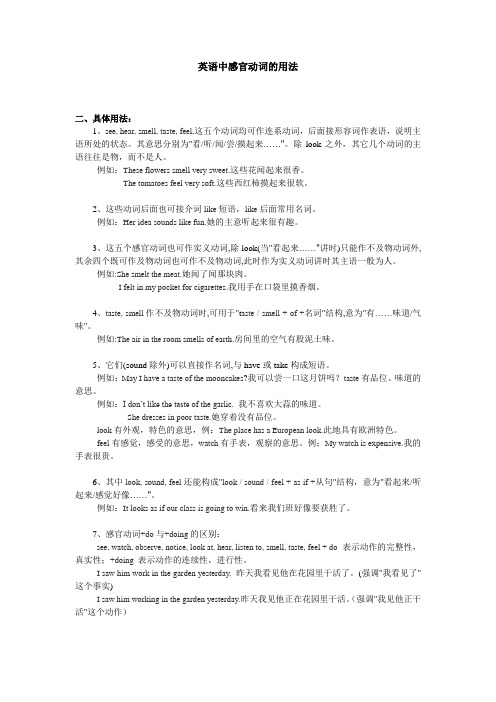
英语中感官动词的用法二、具体用法:1、see, hear, smell, taste, feel,这五个动词均可作连系动词,后面接形容词作表语,说明主语所处的状态。
其意思分别为"看/听/闻/尝/摸起来……"。
除look之外,其它几个动词的主语往往是物,而不是人。
例如:These flowers smell very sweet.这些花闻起来很香。
The tomatoes feel very soft.这些西红柿摸起来很软。
2、这些动词后面也可接介词like短语,like后面常用名词。
例如:Her idea sounds like fun.她的主意听起来很有趣。
3、这五个感官动词也可作实义动词,除look(当"看起来……"讲时)只能作不及物动词外,其余四个既可作及物动词也可作不及物动词,此时作为实义动词讲时其主语一般为人。
例如:She smelt the meat.她闻了闻那块肉。
I felt in my pocket for cigarettes.我用手在口袋里摸香烟。
4、taste, smell作不及物动词时,可用于"t aste / smell + of +名词"结构,意为"有……味道/气味"。
例如:The air in the room smells of earth.房间里的空气有股泥土味。
5、它们(sound除外)可以直接作名词,与have或take构成短语。
例如:May I have a taste of the mooncakes?我可以尝一口这月饼吗?taste有品位、味道的意思。
例如:I don’t like the taste of the garlic.我不喜欢大蒜的味道。
She dresses in poor taste.她穿着没有品位。
look有外观,特色的意思,例:The place has a European look.此地具有欧洲特色。
hear的用法和固定搭配

hear的用法和固定搭配Hear的用法和固定搭配在我们日常生活当中,hear一词的用法是非常常见的。
它是指通过耳朵接收到声音、信息或消息等。
而在具体的使用中,hear也有一些固定的搭配和用法,接下来就让我们来仔细地了解一下。
Hear的用法基本用法Hear作为一个动词,可以用于表达听到的意思。
例如:I can hear the music.我可以听到音乐。
固定搭配Hear也有一些固定的搭配,下面就让我们来了解一下。
1. Hear about这个搭配的意思是听说、得知,常常被用于表达听到某件事情的消息,例如:Did you hear about the accident yesterday?你听说昨天的事故了吗?2. Hear from这个搭配的意思是从某人那里听到消息,例如:I heard from Jack that he can't come tomorrow.我从杰克那里听说他明天不能来。
3. Can't hear oneself think这个搭配用于形容非常吵闹的环境,导致无法集中思考,例如:The construction outside is so loud that I can't hear myself think.外面的建筑工程太吵了,我都听不到自己的思绪了。
4. Hear someone out这个搭配的意思是认真地听取某人的意见或建议,例如:I think you should hear him out before making any decision.在作出任何决定之前,我想你应该认真听取他的意见。
5. Hear it through the grapevine这个搭配的意思是从别人的传言或谣言中听到某件事,例如:I heard it through the grapevine that John got a new job.我从谣言中听说约翰找到了一份新工作。
hear的三种用法

hear的三种用法Hear是一个常见的英语动词,它有多种用法。
在本文中,我们将讨论hear的三种主要用法。
1. Hear的第一种用法是指听到声音或信息。
当我们听到某人说话、音乐或其他声音时,我们可以使用hear这个词。
例如:- I can't hear you. Can you speak up?- I heard a loud noise outside my window last night.- Did you hear about the new restaurant that just opened downtown?在上述例子中,hear被用来描述听到声音或信息的行为。
2. Hear的第二种用法是指获得消息或得知某事。
当我们从其他人那里得到消息或了解某件事时,我们可以使用hear这个词。
例如:- I heard that John got a promotion at work.- Have you heard the news? There's going to be a big storm tomorrow.- I heard through the grapevine that Sarah is getting marriednext month.在上述例子中,hear被用来描述获得消息或了解某件事的行为。
3. Hear的第三种用法是指出席会议、审判等活动并听取证言或陈述。
当我们出席会议、审判等活动并听取证言或陈述时,我们可以使用hear这个词。
例如:- The judge will hear the case next week.- The committee will hear testimony from experts before making a decision.- The teacher will hear presentations from each student in the class.在上述例子中,hear被用来描述出席会议、审判等活动并听取证言或陈述的行为。
hear用法

hear用法hear用法:hear作为一个动词,可以表示“听到,听见”的意思,可以用来描述物体或声音,也可以用来描述人说话。
一、hear用作实义动词,后接名词,表示“听到,听见”,常用于间接引语中,其结构为:hear+名词/代词+that(从句)。
如:I heard that she was going to marry him.我听说她要嫁给他。
He heard the news from his mother.他从他母亲那里听到了这个消息。
二、hear用作实义动词,后接动词不定式,表示“听到,听见”,其结构为:hear+sb. + doing sth.。
如:We heard her singing in the next room.我们听到她在隔壁房间唱歌。
I heard the dog barking in the garden.我听到花园里有狗在叫。
三、hear用作实义动词,后接形容词/副词,表示“听见某种声音”,其结构为:hear+形容词/副词。
如:I heard voices coming from the house.我听到从屋子里传出的声音。
We could hear someone shouting outside.我们能听见外面有人在喊叫。
四、hear用作实义动词,后接介词短语,表示“听到某种声音”,其结构为:hear+介词短语。
如:We heard a noise coming from the kitchen.我们听到厨房里传来的噪音。
I heard someone laughing behind me.我听到身后有人在笑。
五、hear用作系动词,后接形容词/名词,表示“听到某种声音”,其结构为:hear+形容词/名词。
如:We heard loud music coming from the room.我们听到房间里传来的大声音乐。
I heard lovely singing from the balcony.我听到阳台上发出的可爱的歌声。
hear等词的用法
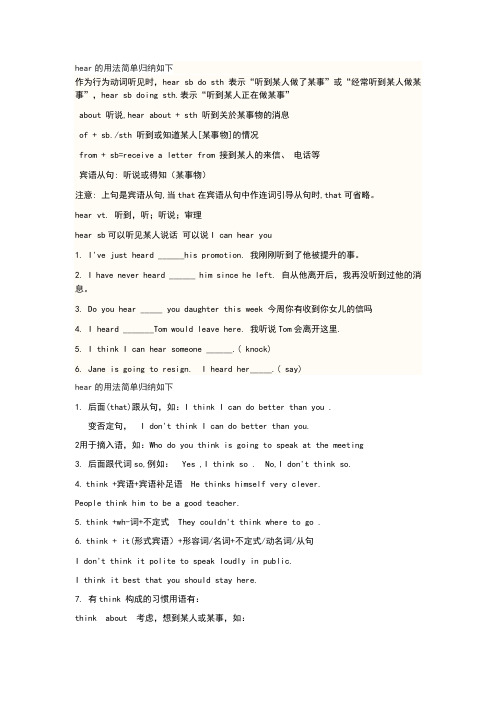
hear的用法简单归纳如下作为行为动词听见时,hear sb do sth表示“听到某人做了某事”或“经常听到某人做某事”,hear sb doing sth.表示“听到某人正在做某事”about 听说,hear about + sth 听到关於某事物的消息of + sb./sth 听到或知道某人[某事物]的情况from + sb=receive a letter from 接到某人的来信、电话等宾语从句: 听说或得知(某事物)注意: 上句是宾语从句,当that在宾语从句中作连词引导从句时,that可省略。
hear vt. 听到,听;听说;审理hear sb可以听见某人说话可以说I can hear you1. I've just heard ______his promotion. 我刚刚听到了他被提升的事。
2. I have never heard ______ him since he left. 自从他离开后,我再没听到过他的消息。
3. Do you hear _____ you daughter this week 今周你有收到你女儿的信吗4. I heard _______Tom would leave here. 我听说Tom会离开这里.5. I think I can hear someone ______.( knock)6. Jane is going to resign. I heard her_____.( say)hear的用法简单归纳如下1. 后面(that)跟从句,如:I think I can do better than you .变否定句, I don't think I can do better than you.2用于摘入语,如:Who do you think is going to speak at the meeting3. 后面跟代词so,例如: Yes ,I think so . No,I don't think so.4.think +宾语+宾语补足语 He thinks himself very clever.People think him to be a good teacher.5.think +wh-词+不定式 They couldn't think where to go .6.think + it(形式宾语)+形容词/名词+不定式/动名词/从句I don't think it polite to speak loudly in public.I think it best that you should stay here.7. 有think 构成的习惯用语有:think about 考虑,想到某人或某事,如:He was thinking about a maths problem.think of 想,想到,如: We must not think only of ourselves.What do you think of this T-shirt8. think over仔细考虑,如:He thought it over and remembered that he had leraned the word "plough".9. think 还有打算、想到的意思,其后常跟动词不定式,例如:When I thought to return,it was too late.10.关于think的反意疑问句主语是第一人称:I think he is right, isn't he主语是第二,三人称:They don't think I'm right,do theyuse的用法简单归纳如下1. used to do sth.意为"过去常常做某事",它表示过去经常发生的动作或存在的状态,而现在已不再发生或存在。
listen, hear, sound的区别和用法 题目

Listen, hear和sound都是与声音有关的词汇,但它们在用法和含义上有所不同。
1. Listen: 这个词通常用于描述有意识地去听某个声音或某人说话。
例如:
- Please listen to me carefully.(请认真听我讲。
)
- I love listening to music when I work.(我喜欢在工作时听音乐。
)
2. Hear: 这个词表示听到某个声音,可以是有意的,也可以是无意的。
例如:
- I can hear the birds singing outside.(我能听到外面的鸟儿在唱歌。
)
- Did you hear what she said?(你听到她说的话了吗?)
3. Sound: 这个词既可以表示声音本身,也可以表示发出声音的动作。
例如:
- The sound of the waves is very soothing.(海浪的声音非常舒缓。
)
- He sounded the alarm when he saw the fire.(他看到火时拉响了警报。
)。
英语三个听的用法

在英语中,“听”有三个主要的用法,分别是:listen、hear和sound。
1.Listen 强调听的动作,后面接人或人物做宾语,着重于“倾听”,至于是否听到,并非
强调的重点。
例如:Please listen to me.(请听我说。
)
2.Hear 强调听的结果,可翻译成“听到”。
过去式heard与of搭配可翻译成“听说”。
固
定搭配:hear sb do sth 听见某人干某事(全过程),hear sb doing sth 听见某人正在干某事。
例如:I can't hear you in such a noisy place.(我无法在这么一个吵闹的地方听见你讲话。
)
3.Sound 强调感受,后加形容词。
翻译成“听上去...”,“听起来...”。
例如:That sounds good.
(那听起来不错。
)
以上三个词的用法并不完全相同,需要根据具体的语境来理解其含义和用法。
感官系动词的用法总结

感官系动词的用法总结感官系动词是指描述感觉和知觉的动词,如看、听、闻、尝、摸等。
在英语中,这些动词的用法与中文有些不同,需特别注意。
1. see:指看到视觉所见的事物,常用于肉眼观察。
例句:I see a butterfly in the garden.(我在花园里看到一只蝴蝶。
)2. watch:指长时间观看,需要集中注意力。
例句:We are watching a movie in the cinema.(我们正在电影院观看电影。
)3. look:指“看”这个过程,用于询问或描述外貌。
例句:Look at that beautiful sunset.(看那美丽的日落。
)4. hear:指听发声音的事物或人,强调听力感官。
例句:I can hear the birds singing outside.(我能听到外面的鸟儿在歌唱。
)5. listen:指有意识地倾听,需要谨慎地注意听声音。
例句:Please listen carefully to what I'm going to say.(请注意听我将要说的话。
)6. smell:指嗅到气味、香气等味道。
例句:I can smell the fragrance of the flowers.(我能闻到花的香味。
)7. taste:指品尝食物或口感。
例句:This cake tastes really good.(这个蛋糕尝起来真的很好吃。
)8. touch:指用手或身体部位接触物体的感觉。
例句:The water feels cold to the touch.(这水摸起来很冷。
)在使用感官系动词时,需要注意搭配动词的时态和语态,以及相应的介词和宾语。
see watch notice hear feel用法

see watch notice hear feel用法
see/notice/watch/hear/feel 常用结构:
V + sb./sth. + do (强调事实或是动作发生在过去)
V + sb./sth. + doing (强调动作正在发生或进行)
1. 作为连系动词时,其意思分别为摸起来/看起来/听起来/闻起来/尝起来……后面接形容词作表语,说明主语所处的状态。
除look之外,其它几个动词的主语往往是物,而不是人。
例如:These flowers smell very sweet.这些花闻起来很香。
2.这些动词后面也可接介词like短语,like后面常用名词。
例如:Her idea sounds like fun.她的主意听起来很有趣。
3.这五个感官动词如果后面接名词作宾语,则这里的感官动词为实义动词,后面必须跟副词修饰动词。
以look一词为例:
He looked at me happily.(实义动词,“看”,后有宾语me ,用副词happily 修饰。
)
He looked happy.(系动词,“看起来……”,后接形容词作表语。
)。
感官动词的用法总结

感官动词的用法总结感官动词的用法总结感官动词是表示某种感受的词,它在日常英语中很常见,具有十分重要的语法作用。
它们一般用来指代人的视、听、嗅、味、触等感官发出的信号,这些信号反映在人的感觉器官上,形成一种特定的感觉。
在日常英语中,有一些常用的感官动词,如:see,hear,smell,taste,feel,watch,listen,notice,observe等。
一、See“see”的基本意思是“看”,它可以用来表示看到某物,也可以用来表示看到某种状态,例如:I see a black cat on the wall.我看到墙上有一只黑色猫。
I see what you mean.我明白你的意思了。
它也可以表示观察某种情况,例如:I saw a man walking in the rain.我看到一个人正在下雨中行走。
也可以用来表示注意到某种变化,例如:I saw the market change a lot.我看到市场变化很大。
二、Hear“hear”的基本意思是“听”,它可以用来表示听见某种声音,例如:I heard a loud voice.我听到一个大声的声音。
也可以表示听到某人说的话,例如:I heard him say he is going to leave.我听他说他要离开了。
它还可以表示听到关于某件事的消息,例如:I heard the news about the earthquake.我听说了有关地震的消息。
三、Smell“smell”的基本意思是“闻”,它可以表示闻到某种气味,例如: I smell something burning.我闻到有什么东西在烧。
也可以表示闻到某种气味,例如:I smell the scent of roses.我闻到蔷薇的芳香。
它也可以用来表示嗅出某种气味,例如:I smelled something strange in the air.空气中有一种奇怪的味道。
感官动词用法大全
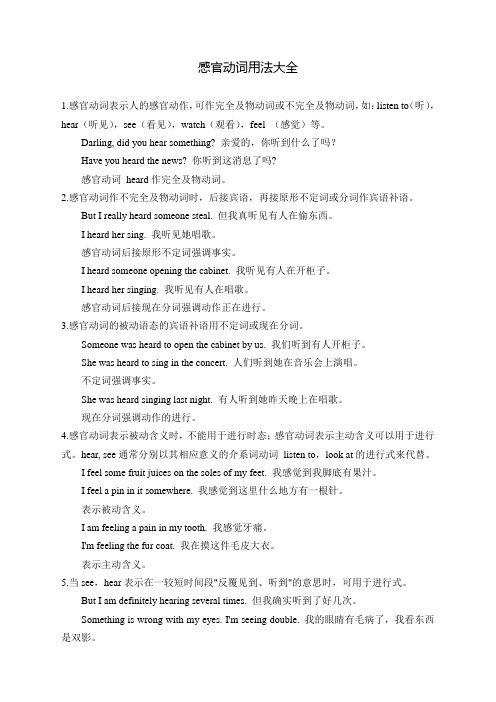
感官动词用法大全1.感官动词表示人的感官动作,可作完全及物动词或不完全及物动词,如:listen to(听),hear(听见),see(看见),watch(观看),feel (感觉)等。
Darling, did you hear something? 亲爱的,你听到什么了吗?Have you heard the news? 你听到这消息了吗?感官动词heard作完全及物动词。
2.感官动词作不完全及物动词时,后接宾语,再接原形不定词或分词作宾语补语。
But I really heard someone steal. 但我真听见有人在偷东西。
I heard her sing. 我听见她唱歌。
感官动词后接原形不定词强调事实。
I heard someone opening the cabinet. 我听见有人在开柜子。
I heard her singing. 我听见有人在唱歌。
感官动词后接现在分词强调动作正在进行。
3.感官动词的被动语态的宾语补语用不定词或现在分词。
Someone was heard to open the cabinet by us. 我们听到有人开柜子。
She was heard to sing in the concert. 人们听到她在音乐会上演唱。
不定词强调事实。
She was heard singing last night. 有人听到她昨天晚上在唱歌。
现在分词强调动作的进行。
4.感官动词表示被动含义时,不能用于进行时态;感官动词表示主动含义可以用于进行式。
hear, see通常分别以其相应意义的介系词动词listen to,look at的进行式来代替。
I feel some fruit juices on the soles of my feet. 我感觉到我脚底有果汁。
I feel a pin in it somewhere. 我感觉到这里什么地方有一根针。
表示被动含义。
感官动词的用法总结

感官动词的用法总结感官动词的用法总结1、感官动词的定义感官动词是指表示人的五官所感受到的各种物质和精神客观世界信息的动词,包括:see、hear、smell、taste、feel五种动词。
2、感官动词的用法(1)一般现在时:主语 + 感官动词 + 宾语例句:I see a bird in the tree.(2)一般过去时:主语 + saw / heard / smelled / tasted / felt + 宾语例句:I heard a loud noise last night.(3)现在完成时:主语 + have / has + seen / heard / smelled / tasted / felt + 宾语例句:I have seen the movie before.(4)过去完成时:主语 + had + seen / heard / smelled / tasted / felt + 宾语例句:He had seen the painting before he went to the museum.(5)现在进行时:主语 + be + seeing / hearing / smelling / tasting / feeling+ 宾语例句:She is hearing the music in the next room.(6)过去进行时:主语 + was / were + seeing / hearing / smelling / tasting / feeling + 宾语例句:He was tasting the soup when I came in.3、感官动词的特殊用法(1)see, hear, smell, taste, feel后面可以接形容词。
例句:I can see the beautiful flowers.(2)see, hear, smell, taste, feel后面可以接不定式。
hear of/ hear from/ hear
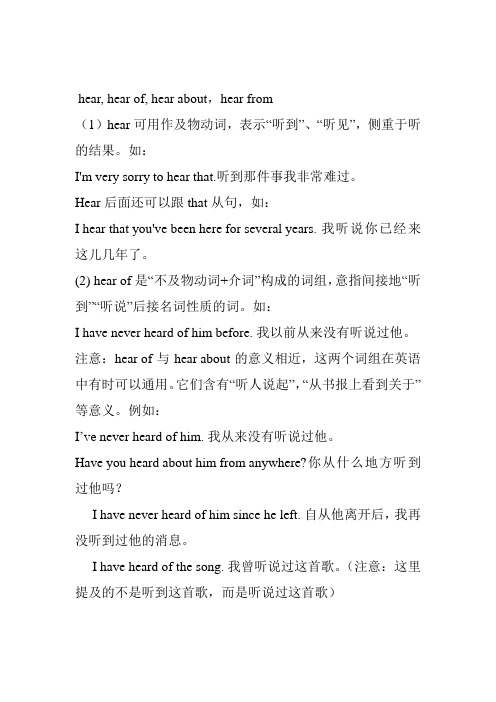
hear, hear of, hear about,hear from(1)hear可用作及物动词,表示“听到”、“听见”,侧重于听的结果。
如:I'm very sorry to hear that.听到那件事我非常难过。
Hear后面还可以跟that从句,如:I hear that you've been here for several years. 我听说你已经来这儿几年了。
(2) hear of是“不及物动词+介词”构成的词组,意指间接地“听到”“听说”后接名词性质的词。
如:I have never heard of him before. 我以前从来没有听说过他。
注意:hear of与hear about的意义相近,这两个词组在英语中有时可以通用。
它们含有“听人说起”,“从书报上看到关于”等意义。
例如:I’ve never heard of him. 我从来没有听说过他。
Have you heard about him from anywhere?你从什么地方听到过他吗?I have never heard of him since he left. 自从他离开后,我再没听到过他的消息。
I have heard of the song. 我曾听说过这首歌。
(注意:这里提及的不是听到这首歌,而是听说过这首歌)She disappeared and was never heard of again. 她失踪了,再没听说过。
(3) hear from指“收到……的来信”与get or receive a letter from 同义,其宾语应是人,而不是信。
如:I often hear from my parents.我经常收到父母的来信。
Hope to hear from you soon.希望你早点来信。
We have not heard from him since he left.自从他离开后,我们一直没有收到他的来信。
- 1、下载文档前请自行甄别文档内容的完整性,平台不提供额外的编辑、内容补充、找答案等附加服务。
- 2、"仅部分预览"的文档,不可在线预览部分如存在完整性等问题,可反馈申请退款(可完整预览的文档不适用该条件!)。
- 3、如文档侵犯您的权益,请联系客服反馈,我们会尽快为您处理(人工客服工作时间:9:00-18:30)。
的用法简单归纳如下hear“”“hear sb do sth1.hear经常听到某人做某作为行为动词听见时,听到某人做了某事表示或”“”hear sb doing sth.听到某人正在做某事,事表示2.hearabout ,hear about + sth 听到关於某事物的消息听说3.hear of + sb./sth [] 的情况听到或知道某人某事物4.hear from + sb=receive a letter from 电话等接到某人的来信、5.hear : 听说或得知(某事物)宾语从句: ,that,that 可省略。
当注意在宾语从句中作连词引导从句时上句是宾语从句hear vt. 听到,听;听说;审理hear sb I can hear you可以说可以听见某人说话1. I've just heard ______his promotion. 我刚刚听到了他被提升的事。
2. I have never heard ______ him since he left. 自从他离开后,我再没听到过他的消息。
3. Do you hear _____ you daughter this week? ? 今周你有收到你女儿的信吗4. I heard _______Tom would leave here. Tom.会离开这里我听说5. I think I can hear someone ______.( knock)6. Jane is going to resign. I heard her_____.( say)hear的用法简单归纳如下1. 后面(that)跟从句,如:I think I can do better than you .变否定句,I don't think I can do better than you.2用于摘入语,如:Who do you think is going to speak at the meeting?3. 后面跟代词so,例如:Yes ,I think so . No,I don't think so.4. think +宾语+宾语补足语He thinks himself very clever.People think him to be a good teacher.5. think +wh-词+不定式They couldn't think where to go .6. think + it(形式宾语)+形容词/名词+不定式/动名词/从句I don't think it polite to speak loudly in public.I think it best that you should stay here.7. 有think 构成的习惯用语有:think about 考虑,想到某人或某事,如:He was thinking about a maths problem.We must not think only of ourselves. think of 想,想到,如:What do you think of this T-shirt? 仔细考虑,如:8. think overplough. He thought it over and remembered that he had leraned the word还有打算、想到的意思,其后常跟动词不定式,例如:9. thinkWhen I thought to return,it was too late.think的反意疑问句10. 关于I think he is right, isn't he?主语是第一人称:They don't think I'm right,do they?主语是第二,三人称:use的用法简单归纳如下1. used to do sth.意为过去常常做某事,它表示过去经常发生的动作或存在的状态,而现在已不再发生或存在。
这个短语含有今昔对比之意,其否定形式常用used not to或didn'tuse to。
反意疑问句中应该用did/didn't或used/usedn't。
例如:I used to _____ in this river when I was young.我年轻时常在这条河里游泳。
They used to _____ good friends, _______ they?他们过去是好朋友,是吗?2. be used to sth. / doing sth.意为习惯、适应某事/做某事,它表示习惯于某一客观事实或状态,其中to是介词,后面跟名词、代词或动名词;be used可用于多种时态;如强调动作可用get或become替换be。
例如:Old people are used to _______ up early in the morning.老年人习惯早晨很早起床。
I wasn't used to city life, but now I have got used to ________ in this city.我以前不习惯都市生活,但现在我已习惯住在这座城市了。
3. be used to do sth.意为被用来做某事,其中use表使用之意,是被动语态形式,to是动词不定式符号。
例如:Wood can be used to make paper.树木可以用来造纸。
4. be used for...意为被当做……,其中use表使用之意,是被动语态形式。
例如:The seal's fur can be used for coats.海豹皮可当做大衣用。
5. be of use意为有用的,其中use是名词,可用形容词来修饰。
例如:The dictionary is of great use to the students.这本字典对学生们很有用。
6. be in use意为在使用,其中use也是名词。
例如:The laboratory is in use until three o'clock.实验室一直到3点钟都有人使用。
7. make use of sth.意为利用、使用某物,其中use也是名词,可用good, full, more, little等形容词来修饰。
同学们应特别注意它的被动形式。
例如:We must make full use of time to study.我们必须充Ⅰ. 单项选择。
( )1. The fashion show is ____ wonderful ____ we all like it.D. very; thatC. such; thatB. so; that A. too; to( )2. —Would you like to have a look at some pants? They may fit you well.—Well, I'd like to try those blue ____.A. pairsB. oneC. pantD. pair( )3. The girl wanted to make a lot of money ____ she could buy the silk cheongsam.A. andB. butC. so thatD. because( )4. The man is ____ than his father.A. handsomeB. much handsomeC. more handsomeD. more handsomer( )5. His parents don't allow him ____.A. smokeB. to smokeC. smokingD. smokes( )6. —____ do you wear? —Size XL.A. What colorB. How sizeC. How muchD. What size( )7. Tom said he ____ at that time.A. is cookingB. cookedC. was cookingD. cooks( )8. I don't know ____.A. where the shop isB. where is the shopC. how can I get thereD. how do you get there( )9. People should ask the police for help when they are ____.A. in dangerousB. in safetyC. in dangerD. in safe( )10. The policewoman stopped the man from ____ something bad.A. doB. doingC. doesD. will do( )11. Is there ____ in today's show?A. something interestingB. interesting somethingC. interesting anythingD. anything interesting( )12. —Excuse me, could you tell me ____?—There's a bank on the second floor. You can do it there.A. where I can change moneyB. how I can get to the bankC. if there's a bank near hereD. where the bank is( )13. The reporter was busy ____ the famous model.A. interviewingB. interviewsC. interviewedD. interview( )14. Kate is a little fat. Her mother advises her ____ clothes in dark colors.A. wearB. to wearC. wearingD. wears( )15. Beijing is in the ____ part of China.A. southB. northC. southernD. Northern( )16. I've never heard ____him before, however,I saw him running on the playground yesterday.A. fromB. ofC. aboutD. out( )17.----Anything else? ----______________A. No,that's all.B. Sure, that all.C. OK,I'm full.D. It doesn't matter. ( )18. Wait a moment,please. It ____about five minutes to prepare your dishes.A. spendsB. costsC. will payD. will take( )19.They really need a house _______.A. liveB. to liveC. to live inD. Lived( )20. Think it over before ______ important decisions.D. makesC. making B. make A. to makeⅡ. 情景交际。
